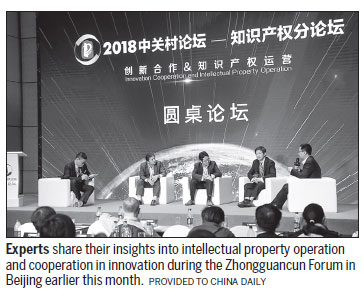Coordinated protection key to development
Coordinated protection and technological innovation are crucial to the commercialization of intellectual property in international markets, insiders said at a recent forum in Beijing.
"The value of IP is to promote commercialization and to achieve innovation development," said Chen Hongbing, head of the World Intellectual Property Organization's China Office at an IP sub-forum of the 2018 Zhongguancun Forum earlier this month.
For global innovation, Chen said that IP authorities in every country should coordinate their work and bring more convenience to IP rights holders.
Zhao Meisheng, deputy director of the patent management department at the National Intellectual Property Administration, said that the IP protection system is a basis of market economy and law.
The price of products will lose control without the regulation of an IP system, he said.
To date, China has set up 23 IP protection centers in the country, Zhao said.
"We treat companies at home and abroad equally in (terms of) IP protection," he added.
Wu Handong, former president of Zhongnan University of Economics and Law, said that innovation is a trend of the times and is a development strategy of China
"Protecting innovation is a basic legal system of a country," he said.
IP protection has been integral to China's innovation development in the international markets over the past decades, Wu said.
"The development of core technology is not just a reinnovation, but should be achieved based on independent creation and IP," he said.
Alan Aubrey, CEO of IP Group, a British-based IP business investing in technology companies, said that China is the world second largest and fastest growing economy.
The key question now, he said, is how to combine the large opportunities there with access to deep technology, and "part of the answer would the continuous investment in the excellent science here and the other answer would be collaborating with global innovators."
IP Group has created a pattern of investing in IP through financial support to universities' research and innovation.
Rong Guanghui, director of corporate relations at the Massachusetts Institute of Technology, said that innovation includes two parts - one is in universities and the other is in the process of commercialization.
Innovation also happens in the production process, he said.
Over the past three to four years, Chinese companies have ranked high in the stock index base on their innovation in business models, he said.
"But, the technological merits have increasingly supplanted the value of business models of companies in the last year or two," he said.
"For this, I have confidence in China's long-term innovation."

